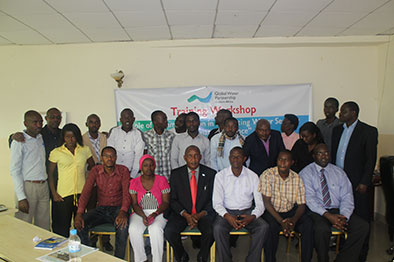The main purpose of the workshop was to equip them with requisite skills and knowledge about Integrated Water Resoures Management and Climate Change Adaptation around Lake Cyohoha. This objective is based on the fact that climate adaptation and sustainable management of the ecosystems and Lake Cyohoha will depend on how stakeholders (residents, fishing cooperatives, local leaders, women associations, youth and decision makers) are aware and fully take ownership of the process towards solutions for the existing challenges. Journalists are traditional GWPEA partners and they play a key role in informing this diversified audience.
The workshop specific objectives were:
- Raise awareness about the issues of water security and climate resilience with particular focus on media as key conveyors of messages
- Equip them with key concepts such as climate change, water security, climate adaptation, climate resilience, water and climate uncertainities, among others
- Create interests in partnering between media from the two countries and GWP Eastern Africa for WIN-WIN solutions(media, GWP Eastern Africa and citizens around Lake Cyohoha as ultimate beneficiaries)
- Create awareness about the importance of communication in promoting water security and climate resilience
The training was conducted through presentations, interactive plenary discussions and group works. Journalists commended the training and produced a number of articles and news on the event as well as challenges of water security and climate resilience. They formulated a number of relevant recommendations that will help GWPEA improve and strengthen its collaboration with media.
Below are the main recommendations :
- GWPEA should help setting up a media network for peer- exchange, information sharing, support, etc….
- GWPEA should continue updating and building the capacity of journalists in CC and IWRM through workshops, field visits, newsletters, websites and any other relevant communication channel
- GWP should facilitate journalists’ access to information by linking them with experts in CC and Water Resources Management
- Government officials should be sensitized to provide information on CC to journalists
- Media managers/editors-in-chief should be sensitized on the importance of reporting on CC and Water
- They should be urged to invest(financial and human resources) in covering stories related to cc and water resources management
- Journalists should make an effort to continuously upgrade their knowledge and report on CC and water(individual effort)
- They should base their stories on well researched data and do a follow up on their stories
- Journalists should focus on local content and proximity in their coverage/Think globally and act locally
- There should be a continuous working relationship between media and GWP/WACDEP and journalists producing good stories on CC and WRM should be recognized through awards.
Photo: The participants of the workshop
